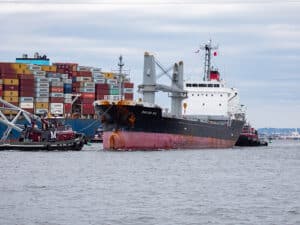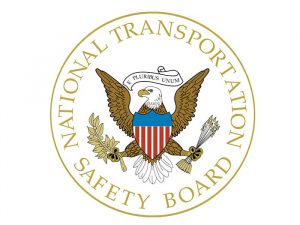
Standard P&I Club warns of spreading fuel contamination
Written by Nick Blenkey
Sludge particles
AUGUST 28, 2018 — The Standard P&I Club has issued an alert warning that the issues with contaminated bunker supplies in the Houston area reported earlier this year continue and have begun to spread worldwide. The alert comes on the heels of INTERTANKO’s release of a Critical Review highlighting both on the extent of the problems being caused by contaminated marine fuels over the last five months and on the lack of any response by authorities (see earlier story).
The Standard Club says that “at present, the source and magnitude of the contaminated bunkers has not been satisfactorily identified and the number of cases is still increasing” and that the club is presently dealing with a number of cases. The club says that “one grounding so far has been a direct result from the use of these contaminated bunkers.
The Standard Club says that the main contaminants are phenol and styrene which cannot be identified from standard tests on the bunker sample under ISO 8217, with samples being confirmed as ‘in specification’ despite phenols and styrene contaminants being present.
Multidimensional Gas Chromatography – Mass Spectrometry (GCMS) testing is required to identify and quantify these types of contaminants, but has to be requested as an additional set of tests.
The club says that “the nature of these particular contaminants leads to very sticky, waxy like deposits which have actually resulted in main and auxiliary engines’ fuel pumps seizing, in addition to blocked heaters, purifiers, filters and excessive sludge build up.
The club notes that GCMS is not a standard testing procedure, and there are only a few laboratories with the necessary equipment/facilities to conduct these tests.
“Normal testing period for GCMS ranges from 5 to 15 days depending on the type of contaminant present as well as the type of tests carried out, as GCMS testing is currently not uniform amongst the various fuel oil testing laboratories,”says the club. “Unfortunately from our research so far, the larger (well known) fuel testing companies in the Houston area have been overwhelmed with sample testing requests resulting in delays of up to 4 to 5 weeks for GCMS, although this period can be reduced to 10 to 15 days when using laboratories in Singapore and the Middle East, due to current low demand.
Based on information received, says the Standard Club, the additional costs involved for GCMS testing aren excess of $1,000 per sample.
Considering the present problems with GCMS testing, the Standard Club recommends that members be proactive and implement best practices in line with the following:
- Contact the manufacturers of your engines and purifiers and request advice on what limitations exist concerning fuel quality for safe, normal operation of their equipment.
- Ensure good bunker management is in place across the fleet.
- Only use known, reputable suppliers and insist that charterers do the same (understood this may be difficult depending on terms & conditions of charter party).
- Check historical records of bunker suppliers with fuel testing laboratories and identify any previous quality issues.
- Samples should be sent for laboratory analysis immediately upon completion of bunkering operations.
- Ensure bunkers are segregated with no comingling taking place during loading.
- Do not consume new bunkers until the analysis report has been received
Contaminated bunkers received onboard
If contaminated bunkers are identified as having been delivered onboard, it is essential that a proactive approach be taken to minimizing their effects wherever possible. Owners and charterers need to cooperate to find the most practical resolution to the issue.
- If possible, bunkers should be chemically treated (if possible) to bring them back within specification, by the use of additives.
- Both owners and charterers will need to ensure that there is alternative fuel supply available onboard to consume during the interim period whilst looking for the best option to remove/offload the affected bunkers ashore.
- Consideration should be given to ensure that adequate cleaning is undertaken of any tanks or pipelines that held the contaminated bunkers prior to discharge to ensure that there is no cross-contamination of future stemmed bunkers.
Read the full Standard Club alert HERE





Leave a Reply
You must be logged in to post a comment.